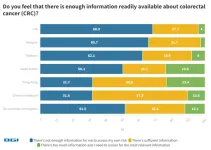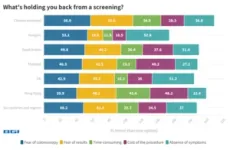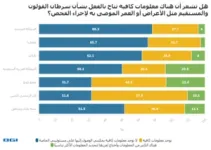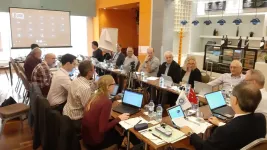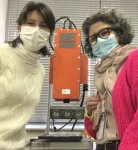Over 60 percent of Saudi Arabian respondents never took a colorectal cancer test | BGI Insight
62.7% in the Kingdom never took CRC tests, far higher than global average of 54.1%
2023-04-11
(Press-News.org)
Colorectal cancer (CRC) is the most diagnosed cancer among males and third among females in Saudi Arabia, with up to two-thirds diagnosed at an advanced stage, according to the King Faisal Specialist Hospital & Research Centre. This report shows Saudi Arabia has a high percentage of respondents (62.7%) who never took CRC tests, far higher than global average of 54.1%. This shows the Kingdom's Early Cancer Detection Program still needs to build greater awareness among the public.
To uncover attitudes and the biggest challenges facing CRC awareness and screening, BGI Genomics released its State of Colorectal Cancer Awareness Report, marking the first-ever global survey report on the world's third most common cancer. This report is in line with achieving Health For All, and seeks to motivate action to tackle key health challenges.
This inaugural report seeks to better understand the global state of CRC awareness, as well as attitudes and actions towards CRC screening for average risk groups and CRC screening for hereditary genetic risk groups. 1,817 respondents from six countries and regions were surveyed: the U.K (Western Europe), Hungary (Eastern Europe), Saudi Arabia (Middle East and Africa), Thailand (Southeast Asia), the Chinese mainland and Hong Kong (North Asia).
Despite 51.5% reporting that there is insufficient information about CRC and 34.5% citing costs holding them back from CRC screening, the report reveals several optimistic findings. For example, 88.8% are more willing to go for screening upon learning about the 5-year survival rate of 90% for early CRC detection.
"Early CRC detection offers the best outcome for individuals and healthcare policy. The treatment cost of late-stage CRC is sometimes more than ten times higher relative to early-stage CRC but with far lower survival rates," said Yantao Li, PhD, BGI Genomics Director of Colorectal Cancer Screening Programme, South-East Asia. "That's why more countries or regions are promoting early screening programs. For example, the European Commission is ramping up CRC screening programs."
Other key takeaways from the report include:
Colonoscopy is the best-known screening test, but there is scope to enhance the awareness of other tests such as fecal tests. Though colonoscopy (68.2%) is the best-known screening test, it is more expensive and cumbersome relative to fecal testing which is lesser known at 49.5%. To promote this more affordable and flexible option, fecal testing awareness needs to be enhanced.
Doctors are the biggest factor for respondents to go for screening in the absence of symptoms. 62.5% will heed their doctor's advice to undergo CRC screening. Therefore, it is vital that doctors are made more aware of CRC symptoms, ask the right questions to identify potential hereditary genetic risk and offer patients a range of screening options, to fit different lifestyles and budgets. In our opinion, the best colorectal cancer screening test is the one a patient will do.
Respondents are split when asked about bringing their family members for screening. 55.7% are aware that a family history of CRC increases their risk. According to the National Comprehensive Cancer Network (NCCN) guidelines, these family members should start screening at age 40 or 10 years before the earliest diagnosis of CRC in the family. The good news is that 67.2% who had CRC or a family history of CRC have taken their family members for screening. Conversely, only 31.2% of all respondents have taken their family members for CRC screening.
To read and view country or region-level comparisons, please see link to access the full BGI Genomics State of Colorectal Cancer Awareness Report 2023.
About BGI Genomics and COLOTECT
BGI Genomics, headquartered in Shenzhen China, is the world's leading integrated solutions provider of precision medicine. In July 2017, as a subsidiary of BGI Group, BGI Genomics (300676.SZ) was officially listed on the Shenzhen Stock Exchange.
COLOTECT is a non-invasive fecal DNA test developed by BGI Genomics for detecting CRC and precancerous lesions. It uses multiplex methylation-specific PCR (MSP) technology to trace abnormal DNA-methylation biomarkers in CRC from stool samples. It has 88% CRC sensitivity, and for early detection, its sensitivity for advanced adenoma is 46%, which are both superior to conventional fecal tests.
END
ELSE PRESS RELEASES FROM THIS DATE:
2023-04-11
Highlights
Excessive alcohol consumption causes short-term and long-term health problems
An enzyme called ADH1B accelerates the breakdown of alcohol in the body
Researchers genetically engineered a probiotic to express ADH1B in mice
Mice treated with the probiotic recovered from alcohol exposure faster than untreated mice, and had fewer resulting health problems
Washington, DC – Excessive alcohol consumption leads to painful hangovers and accompanying headaches, fatigue, and nausea. Drinking alcohol has also been linked to a raft of health problems in the human body, including heart disease, cirrhosis, and immune deficiency. One way to avoid those consequences ...
2023-04-11
In the United States, federal laws were created to effectively decriminalize prostitution in minors under the age of 18. However, state and local justice systems continue to arrest and incarcerate minors for prostitution, despite widespread agreement that youth involved in commercial sexual exploitation are victims, not offenders.
Most youth tend to fall victim to child prostitution and sex trafficking between the ages of 12 and 14. Victims of child prostitution have especially high rates of prior physical, sexual and emotional abuse as well as neglect.
Calli M. Cain, Ph.D., an assistant professor at Florida Atlantic University’s College of Social Work and Criminal ...
2023-04-11
Complimentary press passes are now available for NUTRITON 2023, the annual flagship meeting of the American Society for Nutrition. Join us July 22-25 in Boston to hear about the latest developments in nutrition research, practice, and policy.
After three years of virtual meetings, NUTRITION 2023 will bring the nutrition community back together to share cutting-edge research on nutrition and food science, diet and disease, clinical applications, global health, and more. As one of the world’s largest nutrition ...
2023-04-11
Scientists at The Hospital for Sick Children (SickKids) and the University of Toronto (U of T) have combined forces to develop a new approach to potentially treat tumour cells, called mechanical nanosurgery, even for aggressive, chemoresistant cancers.
Glioblastoma (GBM) is the most common and aggressive primary brain cancer. Despite various treatment options that exist, including surgery, radiotherapy, and chemotherapy, the median survival time for patients is only around 15 months.
The current global standard-of-care treatment for GBM patients includes chemotherapy using a drug called temozolomide (TMZ), which extends a person’s life expectancy by approximately two months compared ...
2023-04-11
Ithaca, NY—Deteriorating habitat conditions caused by climate change are wreaking havoc with the timing of bird migration. A new study demonstrates that birds can partially compensate for these changes by delaying the start of spring migration and completing the journey faster. But the strategy comes with a cost—a decline in overall survival. The findings by researchers from Cornell University, the University of Maryland, and Georgetown University are published in the journal Ecology.
"We found that our study species, the American Redstart, can migrate up to 43% faster to reach its ...
2023-04-11
The Korea Institute of Civil Engineering and Building Technology (KICT, President Kim, Byung-suk) has been participating as Korea’s representative organization in the Energy in Buildings and Communities (EBC) programme, an Technical Cooperation Programme under the International Energy Agency (IEA), since 2005.
The International Energy Agency Energy in Buildings and Communities Programme (IEA EBC) is an international research organization with 25 member countries including the United States, Japan, Germany, France, and, more recently, Brazil and Turkey. Established in 1977 in response to the global energy crisis, EBC aims to conduct research on conserving energy and ...
2023-04-11
Viruses are usually associated with illness. But our bodies are full of both bacteria and viruses that constantly proliferate and interact with each other in our gastrointestinal tract. While we have known for decades that gut bacteria in young children are vital to protect them from chronic diseases later on in life, our knowledge about the many viruses found there is minimal.
A few years back, this gave University of Copenhagen professor Dennis Sandris Nielsen the idea to delve more deeply into this ...
2023-04-11
VANCOUVER, Wash. – Gossip influences if people receive advantages whether they work in an office in the U.S. or in India—or even in a remote village in Africa, a Washington State University study found.
In a set of experiments, WSU anthropologists found that positive and negative gossip influenced whether participants were willing to give a person a resource, such as a raise or a family heirloom, especially when the gossip was specific to the circumstance. For instance, positive gossip concerning ...
2023-04-11
Research Highlights:
A wireless or leadless (without wires) pacemaker was implanted in a select group of children with irregular heart rhythms during a 5-year period (2016-2021).
Smaller catheters that allow easier placement of the leadless pacemaker in children’s smaller bodies may expand wireless pacemakers as an option to consider for more children with irregular heart rhythms.
DALLAS, April 11, 2023 — Wireless or leadless pacemakers, commonly implanted in adults, may be a safe and effective short-term ...
2023-04-11
An innovative method developed by an Italian team is emerging that will revolutionize the field of archaeology and radiocarbon dating and protect our cultural heritage. The researchers have used it with surprising results on archaeological bones, making the ‘invisible’ visible.
This important achievement-published in the journal Communications Chemistry of the Nature group-is the result of extensive research work coordinated by Professor Sahra Talamo, in which experts in the field of analytical chemistry from the University of Bologna and the University of Genoa collaborated.
The group has developed a new technique for analyzing archaeological ...
LAST 30 PRESS RELEASES:
[Press-News.org] Over 60 percent of Saudi Arabian respondents never took a colorectal cancer test | BGI Insight
62.7% in the Kingdom never took CRC tests, far higher than global average of 54.1%
